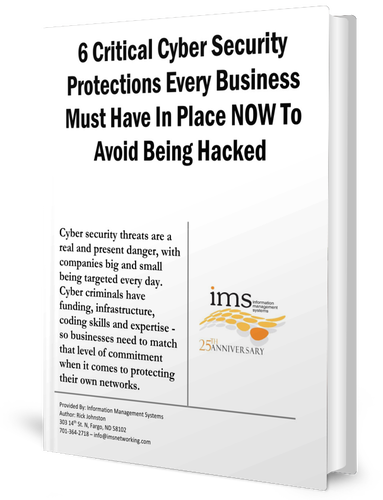
The holiday season is a time for generosity—but unfortunately, it’s also a busy season for scammers.
As a small business owner, you’re probably receiving more donation requests than usual—emails, social media fundraisers, even phone calls. While giving back is a great way to support your community, falling for a fake charity can hurt more than your wallet. It can damage your reputation and expose your business to cyber threats.
Let’s walk through how to give safely, protect your business, and keep your holiday season focused on what really matters.
Why Holiday Scams Are a Real Risk for Small Businesses
Scammers love the holidays because people are emotional, busy, and more likely to act without thinking. One wrong move can connect your business name to a fake fundraiser or phishing scam.
Even worse? The same tactics scammers use in fake donation requests—urgency, emotional stories, impersonation—are also used in phishing emails, invoice fraud, and business email compromise. Teaching your team to spot donation scams builds stronger awareness across the board.
How to Check If a Fundraiser Is Legitimate
Before your business donates—especially online—make sure these questions are clearly answered:
- Who is organizing this fundraiser? Are they connected to the recipient?
- Where is the money going? Is there a clear purpose and timeline?
- Who controls the funds? Can you see how it will reach those in need?
- Is there public support from the recipient’s close contacts?
Vague answers or dodging your questions? That’s your cue to step back.
Red Flags That Often Mean “Scam”
If you spot any of these, hit pause:
- Emotional stories that feel too perfect or manipulative
- Fundraisers reusing stories or photos from other campaigns
- Requests to donate via gift cards, wire transfers, or cryptocurrency
- High-pressure tactics like “We need it right now”
- Fundraiser pages with broken links, missing info, or no secure website connection (look for https)
Even well-designed pages can be fake. When in doubt, do a little digging—or ask your IT team for help.
Don’t Forget to Vet Charities—Not Just Crowdfunds
Even well-known charities can have questionable practices. Before you make a public or private business donation:
- Check how much actually goes to programs vs. overhead
- Review their financials or annual reports if available
- Search the organization’s name with terms like “fraud,” “complaints,” or “scam”
- See if they’re listed on watchdog sites like Charity Navigator or Guidestar
Why This Matters For Your Business
When you give under your business name—or an employee gives through a company initiative—that generosity becomes part of your brand. But if the recipient turns out to be a fraud, your business could get caught in the blowback.
And let’s be honest: if your team is falling for donation scams, they’re also vulnerable to other threats like phishing links or bogus invoices. One mistake can create real downtime—and that’s the last thing your business needs in December.
5 Ways to Protect Your Business While Giving Back
- Create a Company Donation Policy
Outline how your business chooses charities, sets donation limits, and approves causes. - Train Your Team
Encourage employees to verify fundraisers before giving—especially if representing your company. - Use Trusted Channels Only
Donate directly through official charity websites, not through random links in emails or social media. - Do Your Homework Publicly
If you’re promoting a charity your business supports, make sure it holds up to scrutiny. - Follow Up Post-Donation
Many charities offer impact reports. Check back to see how your donation was used.
Trusted Tech Makes Safer Giving Easier
At Information Management Systems (IMS), we’ve helped local businesses across North Dakota, South Dakota, and Minnesota stay protected through all kinds of scams—holiday-related or otherwise.
Our proactive support means your team can work without the worry of cyber threats, fake fundraisers, or suspicious emails slowing things down. We’ll train your staff, lock down your network, and keep your good intentions from becoming costly mistakes.
Give With Confidence This Holiday Season
Let this season be about community—not crisis.
Need help setting up safe donation policies or scam awareness training for your team? We’d love to support you. Let’s talk about how IMS can protect your business—and your brand reputation—all year long.
👉 Book a free discovery call
Or call us at (701) 364-2718
Holiday Donation Scams – Frequently Asked Questions (FAQ)
Q: How can I quickly tell if a donation request is fake?
A: Look for urgency, emotional pressure, vague details, or unusual payment methods (like gift cards or crypto). If anything feels “off,” don’t donate until you’ve verified it.
Q: Are business donations more risky than personal ones?
A: They can be. Donations under your business name—especially if public—carry more weight. If the recipient turns out to be fraudulent, it could affect your brand’s reputation and customer trust.
Q: What’s the safest way for my company to donate to a cause?
A: Always donate through verified websites, not through social media links, emails, or text messages. Stick to well-known charities or ones you’ve vetted yourself.
Q: Should I let employees donate on behalf of the company?
A: Only if you have a clear donation policy in place. It’s smart to set approval steps for anything involving your business name or branding.
Q: What do I do if I think we donated to a scam?
A: Report it immediately. Contact your bank or credit card provider to stop the transaction. Then file a complaint with the FTC (ReportFraud.ftc.gov). You may also want to alert your IT provider to check for any related phishing threats.
Q: Can IMS help my team recognize scams like these?
A: Absolutely. We offer employee training, scam awareness education, and proactive security tools that make your whole business more resilient to cyber threats—not just during the holidays, but year-round.



